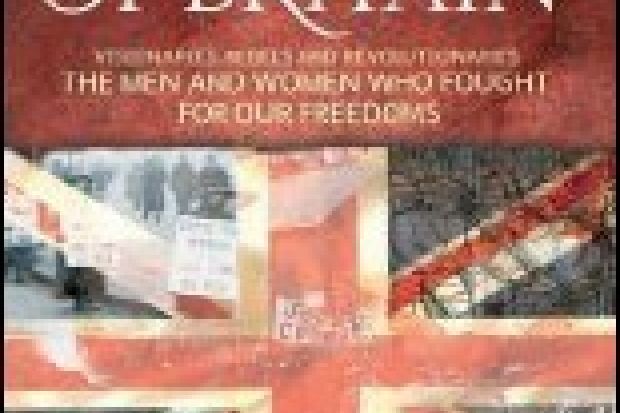There are alternative pageants of British history. The most familiar is a procession of all those kings and queens with their lords, knights and archers, giving way to politicians in wigs and glamorous Georgian ladies, and succeeded in turn by more soberly dressed chaps passing reform acts and worrying about drains.
Then there's the radical version, retold by Edward Vallance: true, it starts off in much the same way with Magna Carta, but then we have a new procession of heroes and, in time, some heroines; this is a tale of peasant revolts, Levellers and Diggers, Chartists and suffragettes.
Vallance does not provide us with a new interpretation of British or English history, for much of this book will be familiar to those who have read G.D.H. Cole, the Webbs, E.P. Thompson, Christopher Hill or even Robert Blatchford. But he tells the story well, welding the landmarks of a leftist view of history into a national history that is a trenchant salute to the tradition of dissent and demands for social and political reform. He describes the "heroic" struggles and achievements that he thinks led to our present political rights.
Whether "radical" is the right word to describe this history of a mixed bunch of people and movements is debatable for, although radical certainly describes those advocating thoroughgoing social and political reform, it usually carries the caveat of "by constitutional means". Those generally associated with the term's 19th-century usage, such as James and John Stuart Mill, Jeremy Bentham, Richard Cobden and John Bright, receive, at best, faint praise from Vallance.
His real heroes are those determined on revolt, the rebels and revolutionaries of the subtitle, although the choice of rebellious movements is somewhat selective and the Jacobites are significant by their absence. By a coincidence, David Horspool's The English Rebel was published almost simultaneously with Vallance's book, which perhaps points to widespread contemporary disenchantment with our established order.
In some ways, Vallance's account is Whig history without the Whigs and with radicals, rebels and revolutionaries in their place, but with the same pattern of progress towards a happy outcome. His radical tradition is, as he admits, an "enriched English" rather than a British tradition, and his radicals were often conservative in their vision of a past in which liberty had flourished before the Norman yoke harnessed freeborn men or industrialisation attenuated it, and were determined to regain the rights of Englishmen.
This well-written and stimulating book makes a convincing case for the radical and/or rebellious tradition as part of the warp and woof of British history, but whether it was the main determinant of social and political change, which this book comes close to arguing, is highly questionable. The case for continuity is well made, however, for there was a misty continuum between generations of dissidents, each evoking, however anachronistically, their predecessors.
Unrest may have been stirred by present discontents, but popular dissension usually manifested itself in movements that mixed appeals to a better past with hopes for the future. Chartism is a good example, having been seen as both proto-socialist and nostalgic, and expressing, with its flags, ceremonies, language and attachment to the idea of smallholdings, popular memories and traditions.
The sceptic will ask whether constitutional milestones and social change were really achieved by demonstrations, riots, revolts, plots and rebellious movements. They had their influence, but economic developments, the widened middle orders of society, inter-elite disputes, the emergence of the respectable working class in the 19th century and the rivalries of high politics do more to explain Britain's constitutional development.
No peasant revolt was going to transform medieval society and the Black Death had rather more influence. Chartism came before five of its six points - more accurately four and a half because electoral districts remain far from equal - became law, but there is little evidence that it determined this. Many pages are spent on the suffragettes but, as Vallance accepts, the suffragists did more to win over opinion, particularly elite opinion alienated by violent protests, while economic and social change that transformed the position of women did much to determine the outcome.
The "spectacular pageant" ends with the advent of female suffrage, although there is a somewhat flimsy final chapter, titled rather misleadingly "The Fight against Fascism", which provides a review of British history since the First World War, and an epilogue that considers the state of British liberties today. Here Vallance qualifies his support for indigenous radical tradition and moves closer to support for abstract human rights embodied in written constitutions, rather than the empirically grounded rights whose development he has discussed.
This dismisses British liberty too easily. Both British conservatism and radicalism are grounded, not in abstract reasoning, but in tradition and institutions. It is a reassertion of this tradition that provides the best bulwark against an all-powerful and intrusive state with a tendency to engineer society in the interests of some rational blueprint.
A Radical History of Britain: Visionaries, Rebels and Revolutionaries - The Men and Women Who Fought For Our Freedoms
By Edward Vallance
Little, Brown, 656pp, £25.00
ISBN 9781408700501
Published 4 June 2009
Register to continue
Why register?
- Registration is free and only takes a moment
- Once registered, you can read 3 articles a month
- Sign up for our newsletter
Subscribe
Or subscribe for unlimited access to:
- Unlimited access to news, views, insights & reviews
- Digital editions
- Digital access to THE’s university and college rankings analysis
Already registered or a current subscriber? Login
